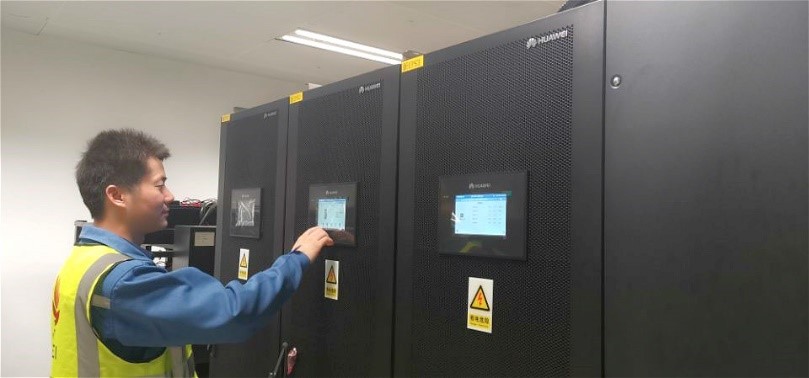Laying the Foundation for Shenzhen Airport to Become a "Future Airport" with Huawei UPS
Enterprise products, solutions & services
With a bold vision to connect the world and become a world-class international aviation hub, Shenzhen Airport's annual passenger throughput has surged to 52 million, making it China's fifth largest airport in just 29 years of existence.
And this momentum is showing no signs of slowing: Indeed, Shenzhen Airport is the only airport in China participating in the International Air Transport Association's (IATA) "Future Airport" pilot program. To realize the program, a large number of future-oriented upgrade and reconstruction projects are being implemented. One key project of its Future Airport Phase II implementation is the upgrade of its Uninterruptible Power Supply (UPS) system. Such an upgrade provides a solid energy foundation to build a smart future airport from, as well as reconstruct the Information and Communications Technology (ICT) infrastructure platform.
The airport’s legacy UPS was aging badly, leading to increased fault rates. To compound the issue, there was a lack of spare parts because the original equipment had been discontinued. And maintenance work was heavily dependent on the original manufacturer, representing a serious potential risk. In sum, these challenges were impairing Shenzhen Airport's efforts to build a smart future airport.
With the goal of becoming the benchmark for future airports, Shenzhen Airport set high standards for its UPS replacement and it felt that any new equipment should be leading the industry’s future evolution. It also needed a supplier with extensive experience in cutover assurance, to secure operational processes.
With a modular and multi-redundancy design that eliminates single points of failure and ensures the smooth running of key services, Huawei's modular UPS has already been tested in the industry. The Artificial Intelligence (AI) proactive warning function of components — such as capacitors and fans — shifts Operations and Maintenance (O&M) from passive to proactive prevention. Furthermore, all modules are hot swappable and can be replaced within five minutes when a fault occurs, further simplifying O&M. Such benefits convinced Shenzhen Airport that Huawei's UPS solution met their requirements for future airport assurance and chose Huawei's UPS5000 series for the upgrade.
At 03:00 in the morning on July 18, the Shenzhen Airport and Huawei team completed the online cutover of the second UPS with zero errors, just 13 days after the first successful cutover, and five days earlier than the original plan. This means that there is momentum for the next 24 sets of UPSs to be cutover and put into use. In total, 30 medium and large-sized UPS systems will eventually be deployed in ten power distribution rooms located across the terminal and in the Information Technology Center (ITC).

Huang Biao, General Manager of the Shenzhen Airport Digital Management Center, said: "The successful cutover of the project means that our success is not accidental. With the support of Huawei, the maintenance level of the airport UPS system is raised to a new level. It also proves that if the process of replacing old UPS hosts is highly operable and the solution is correctly formulated, UPS online cutover is feasible and controllable. All team members of the airport are confident about the subsequent cutover and future O&M assurance. Looking into the future, I hope that Huawei will continue to use its best products and services to help Shenzhen Airport build an international aviation hub, continue to move towards the goal of 'Future Airport,' and realize the strategic vision of leading the airport group with excellent global management and innovation as soon as possible."
Customer recognition and trust are the driving force behind Huawei's ongoing innovation and efforts to push forward. Indeed, Huawei UPS is seeking to develop towards high frequency, modularization, and intelligence.
Huawei's modular UPS worldwide market share has ranked number one for five consecutive years and it also ranked first in China's overall UPS market in 2019. This has only been made possible by focusing every UPS innovation on customer requirements, to help them achieve business success. In the future, Huawei will continue to further integrate power electronics and digital technologies — using ‘AI boost’ and ‘bits managing watts’ — to build simple, smart, green, and reliable UPS products. Huawei also will continue to innovate to create more value for customers and set new benchmarks for the industry.
